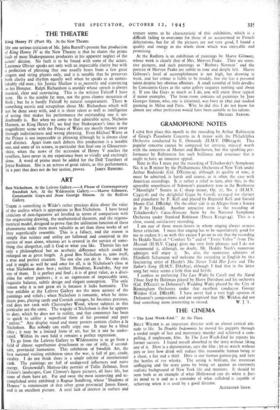GRAMOPHONE NOTES
I GIVE first place this month to the recording by Arthur Rubinstein of Grieg's Pianoforte Concerto in A minor with the Philadelphia Orchestra conducted by E. Ormandy (H.M.V. DB6234-6). This popular concerto cannot be compared for intrinsic musical worth with the concertos of Mozart and Beethoven, but this sparkling per- formance by Rubinstein has such brilliance and assurance that it ought to.have an immense appeal.
Next to this I must put the recording of Tchaikovsky's Symphony No. 6 in B minor by the Philharmonic Orchestra of New York under Arthur Rodzinski (Col. DX12o5-9), although its quality of tone, it must be admitted, is harsh and coarse, as is often the case with American recordings. It is rather a relief to turn, after. this, to the agreeable smoothness of Solomon's pianoforte tone in the Beethoven " Moonlight " Sonata in C sharp minor, Op. 27, No. 2 (H.M.V. C3455-6) and the delightful Gigue by Corelli arranged for clarinet and pianoforte by F. Kell and played by Reginald Kell and Gerald Moore (Col. DB2189). On the other side is an Allegro from a Sonata in F by Handel. Another attractive item is the recording of Tchaikovsky's Casse-Noisette Suite by the National Symphony Orchestra under Stanford Robinson (Decca K1142-44). This is a clear, sound, satisfactory recording.
I am one of those music-lovers in whom singing always arouses fierce criticism. I mean that singing has to be superlatively good for me to endure it ; so with this excuse I go on to say that the recording by Heddle Nash of "Comfort Ye " and of " Every Valley " from The Messiah (H.M.V. C3454) gives me very little pleasure and I do not recommend it, although, no doubt, Mr. Heddle Nash's numerous admirers will enjoy it. So, also, the numerous admirers of Elizabeth Schumann will welcome the recording in English by this fascinating artist of Haydn's She Never Told Her i.ove and The Sailor's Song (H.M.V. DA185o), although I find that in the latter song her voice seems a little thin and brittle.
I confess to preferring The Last Waltz by Caryll and the Naval Three Step by Holzman played by Harry Davidson and his orchestra (Col. DXt2I t) to Dohnanyi's Wedding Waltz played by the City of Birmingham Orchestra under that excellent conductor George Weldon (Col. DB2188). I have never had a very high opinion of Dohnanyi's compositions and am surprised that Mr. Weldon did not
find something more interesting to record. W. J. 1.


























 Previous page
Previous page